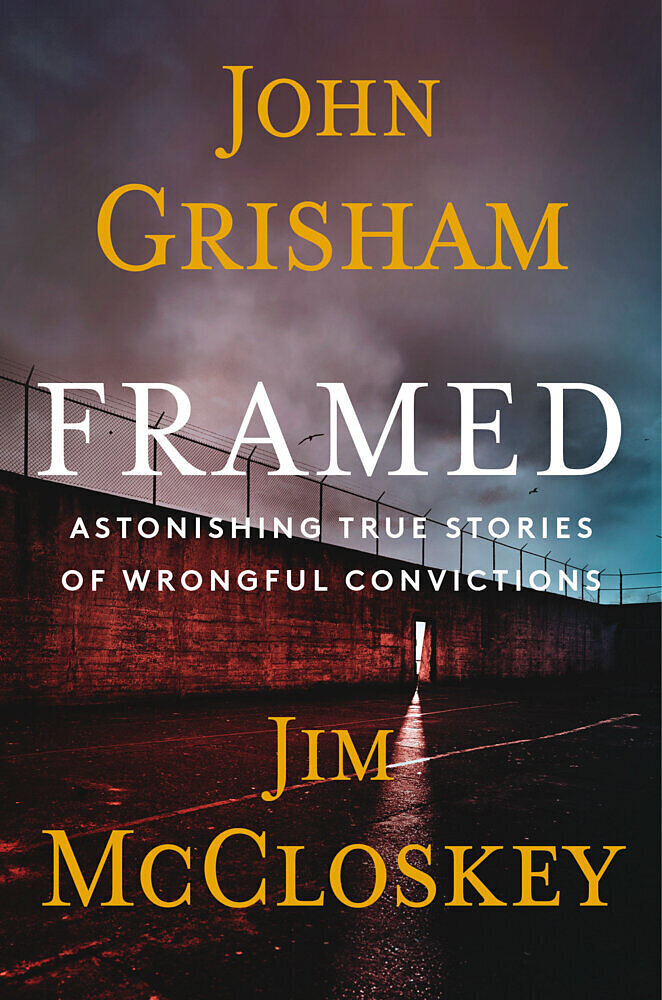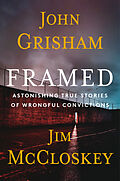

Framed
Beschreibung
In his first work of nonfiction since A fundamental principle of our legal system is a presumption of innocence, but once someone has been found guilty there is very little room to prove doubt. Told with page-turning suspense as only John Grisham can deliver, ...Format auswählen
- Fester EinbandCHF 31.60
- Fester EinbandCHF 250.40
- Audio CD (CD/SACD)CHF 53.50
- Kartonierter EinbandCHF 33.50
Wird oft zusammen gekauft
Andere Kunden kauften auch
Beschreibung
In his first work of nonfiction since A fundamental principle of our legal system is a presumption of innocence, but once someone has been found guilty there is very little room to prove doubt. Told with page-turning suspense as only John Grisham can deliver, <Framed <is the story of overcoming adversity when the battle already seems lost, and the deck is stacked against you.
Autorentext
John Grisham and Jim McCloskey
Klappentext
In his first work of nonfiction since The Innocent Man, #1 bestselling author John Grisham and Centurion Ministries Founder Jim McCloskey share ten harrowing true stories of wrongful convictions. Impeccably researched and grippingly told, Framed offers an inside look at the injustice faced by the victims of the United States criminal justice system.
A fundamental principle of our legal system is a presumption of innocence, but once someone has been found guilty there is very little room to prove doubt. Framed shares ten true stories of men who were innocent but found guilty and forced to sacrifice friends, families, wives, and decades of their lives to prison while the guilty parties remained free. In each of the stories, John Grisham and Jim McCloskey recount the dramatic hard-fought battles for exoneration. They take a close look at what leads to wrongful convictions in the first place, and the racism, misconduct, flawed testimony, and the corrupt court system that can make them so hard to reverse.
Told with page-turning suspense as only John Grisham can deliver, Framed is the story of overcoming adversity when the battle already seems lost, and the deck is stacked against you.
Leseprobe
Preface
John Grisham
In 2006, I published The Innocent Man, a true story about the wrongful conviction and near execution of Ron Williamson. Before then, I had never considered nonfiction I was having too much fun with the novels but Ron s story captivated me. From a pure storytelling point of view, it was irresistible. Filled with tragedy, suffering, corruption, loss, near death, a measure of redemption, and an ending that could not be considered happy but could have been much worse, the story was just waiting for an author. I soon learned that every wrongful conviction deserves its own book.
Since then I ve met many exonerees, along with their families, lawyers, advocates, and old cellmates. As a group, they are amazing because they somehow survived nightmares that the rest of us cannot begin to comprehend. Most enjoy telling their stories. All are determined to change a broken judicial system and prevent more wrongful convictions. Dozens have written about their ordeals. More than a few have asked me to do the writing.
For a long time I ve thought about a collection of some of the best stories, but the research got in the way. It is daunting. Thousands of pages of trial transcripts, police reports, witness statements that always seem to vary from one stage to the next, prison records, forensic tests, and petitions, motions, pleadings, and orders written by lawyers and judges and filed, seemingly, by the pound. Novelists can be lazy because we simply make up stuff. Nonfiction is brutal because the research has to be meticulous. You can t afford to make mistakes.
I met Jim McCloskey about fifteen years ago when he asked me to speak at a Centurion Ministries annual gala at Princeton. Within ten minutes of first shaking hands we were telling war stories of the wrongfully convicted. Jim s stories are always better, because he lived them. He is part of them. He made the exonerations happen by pounding the streets from coast to coast in search of the truth. Centurion has been involved in about seventy exonerations, and Jim was usually there, outside the prisons, when his innocent clients walked out and into the arms of their loved ones. He was there when they tasted freedom, and he was the reason for it.
At some point a few years back, we began talking about this collection. The idea was simple. I would select five of my favorite stories, and so would Jim. The first challenge was to pick only ten, because there are so many. The second challenge was to limit each story to about 10,000 words. Since each story could fill a library, we knew the task would be formidable. We agreed that each would do his own writing with limited input from the other.
And so we wrote.
Our goal with this book is to raise awareness of wrongful convictions and in some small way help to prevent more of them. It is an effort to shine light on some of the terrible and abusive tactics used by the authorities to convict innocent people.
If we as a society had the political gumption to change unfair laws, practices, and procedures, we could avoid virtually all wrongful convictions.
**
Jim McCloskey
**
As John points out, our association and friendship go back fifteen years. We were drawn together by our mutual concern and compassion for those men and women across America who fell victim to a deeply flawed criminal justice system and were falsely convicted and sentenced to a life sentence or to death. John generously volunteered to write the foreword to my memoir, When Truth Is All You Have, published by Doubleday in 2020. That book recounts the forty-year history of Centurion Ministries encounters with our nation s judicial system on behalf of the convicted innocent as well as the personal journey that led me into this work.
